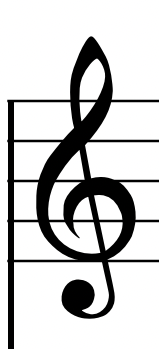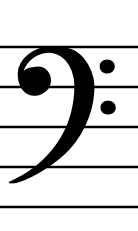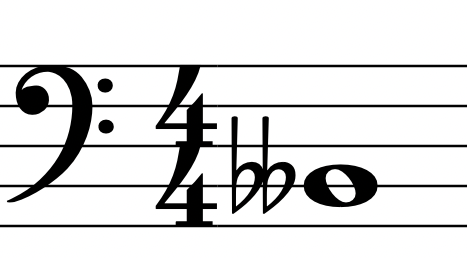- Jack Mitchell Smith

- Apr 3, 2024
- 12 min read
Updated: May 13, 2024
Finally - a blog post that speaks to us all. Those just starting and those of us craving to know more!
Whatever you think you know about the notes of a keyboard - think again! For whilst I am going to take you back to the basics for the sake of finding notes at the start of this post, I will be blowing your mind by the end of it!
Just remember to breathe, don't be afraid and don't rush through until you understand (bear in mind a lot towards the end of this post is advanced music theory - so don't worry if it doesn't all come naturally and just focus on the parts of this blog you need!)
The Basics - Finding Natural Notes
On our standard piano keyboard, we have black keys and we have white keys.
A good 90+ percent of beginners will start their learning around the white keys (this is neither right 'nor wrong, but just how many pupils and / or teachers like to begin) and - academically speaking - it is a very good place to start.
The reason for this is because all of the white notes are termed as being natural notes. You don't generally refer to them as being natural as you refer to them - it is assumed that no mention of it means natural. Therefore, our white keys are A-B-C-D-E-F-G, which then repeat a fair few times. An 88 key keyboard / piano even starts on A to make this first part fairly logical.
However, of those pupils who learn white keys first, virtually 100% of them learn as their first note the note we call Middle C.
To find any C, locate any group of two black notes and you will find C as the white note immediately to the left.
Middle C is, as you might expect, is the C nearest the middle of the keyboard. On an 88 key keyboard or piano, this is the fourth C. On a 61 key keyboard it will be the third C.

The rest of the note names follow on very logically up the white keys, as they remain alphabetical. So from C, we move on to D, E, F etc. - noting that after B you will have found another C. Similarly, we can go backwards and just recite the alphabet backwards, restarting from G when we reach A.

HOWEVER one thing that I love to encourage is to not rely on your C as your one point of reference. Yes, you can learn that C is immediately left of the group of two black notes, but what a lot of beginners will then do is use that as their sole reference for finding other notes. For example, if they wish to find F, they will locate C and then count up. They will be correct, but they won't develop the instinct as quickly as they could by learning their navigation of the keyboard sooner.
By all means use the method of finding notes from C to begin with, but every time you do find a note, make a mental (or physical) note of where it is until it becomes second nature.
You could be academic in your approach:
D lies between the two black notes,
E lies just right of the two black notes
etc.
...but let's not forget that one of the strongest aids when it comes to remembering things is visualisation of the obscure. Perhaps the two black notes remind you of two guards standing side by side, and they are trapping someone you know whose name begins with D - the note name you need to remember (think Dan, Debbie etc.). What a tragic image for them. What a useful tool for you...
Experiment with the white notes and learn how to navigate around them, and when you feel fairly comfortable with the notes you can start to spell words that use letters A - G; Beef, Egg, Ace, Face, Bead etc. - try spelling out the words as quickly as you can (note this can also be a good exercise for working on your fingering and musicality a little later down the line. Don't feel you have to approach each note with one pointed finger - use the span of the hand to add some nice transition and legato to the 'words'). Don't be tempted even to stick in the same octave - try with two hands and alternate, jumping around the keyboard as you do. You'll begin to feel much more confident in aiming for the notes!
The Basics - Finding Sharps and Flats
The good news is that we're halfway there when it comes to finding sharps and flats! We should by now be comfortable with finding our natural notes (white notes) so now all we need to do is remember this simple rule:
Sharp Notes are raised by a semitone
Flat Notes are lowered by a semitone
Our understanding of a semitone in this case should be that it is simply one note - white or black. One note up or down to the note directly next to it - regardless of colour - is a semitone apart.
We only have five black notes that are repeated in patterns of two then three, so all we need to do now is to identify which one of two notes they could be. 'This' sharp or 'That' flat.
For example, the first black note in the group of two lies immediately next to C (one semitone higher) - therefore it is C sharp. It also lies one semitone lower that D. Therefore, we could also call it D flat. Harmonically these are, of course, interchangeable because it is literally the same note, however the reason for having two options is grounded in a more advanced music theory that I will briefly touch upon towards the end of this blog.

A Spanner in the Works...
Those eagle eyed readers who are doing lots of experimenting will, no doubt, have noted that with all this talk of semitones, there are in fact two repeated pairs of white notes that sit one semitone apart, no black note between them. These are B and C, and E and F.
So could this mean that - using the above logic - E could be F flat because it is one semitone lower than F? F could be E sharp? B could be C flat? C could be B sharp?
Yes, yes, yes and yes!
But don't panic!
This is also grounded in the same advanced music theory that I will touch upon towards the end of the blog. But for beginners, we just need to know them as their naturals.
Note Names on Printed Music
If you are learning to read music (as I - and most other teachers strongly encourage when learning piano), you will need to be able to find your way around the stave. This is the group of five lines of which most piano music has two (the right hand and the left hand).
You will almost always begin learning the right hand and the left hand in two different clefs. The right hands is always started out in the treble clef and the left hand in the bass clef.
Pictured above is the treble clef and the bass clef, respectively.
As an initial point of teaching, I like to show my pupils that Middle C is kind of a mirror image on the clefs. Where it lies below the stave on the treble clef is the same position that it lies above the stave on the bass clef.

And if you think about it, this is a perfectly logical solution. Your left hand will descend down from Middle C and stay relatively in that area to accompany, whereas your right hand will usually work above Middle C to create a clear, distinctive melody. It just makes it far less messy to keep the bulk of the notes that you play within the five lines of the stave. Easier to write and easier to read!
But are there other ways we can identify the notes? Surely we can't be expected to count up or down from Middle C every time we want to know the next note?
Well...yes!
There are mnemonics that seem to have been taught for longer than music itself!
For the treble clef, the lines reading up from the bottom are E, G, B, D, F. The classic mnemonic is 'Every Good Boy Deserves Favour'.

Focusing now on the spaces, the spaces reading up from the bottom spell the word FACE!

Leaving us with the bass clef.
The spaces reading up from the bottom are A, C, E, G. The classic mnemonic is 'All Cows Eat Grass'.

A mnemonic used for the lines reading up from the bottom in the bass clef is 'Good Boys Do Fine Always', although I dare say this was one I was never taught (thanks Google for filling me in on that one).

As always, you can make up your own. Just make sure you remember which clef they belong to!
NB - be sure to learn where Middle C is on your piano and on both clefs. This will ensure that you don't play in the wrong part of the keyboard. For example, the 'Every' on the treble clef is the E above Middle C, whereas 'Cows' on the bass clef is the C below middle C (the distance between two of the same note are measured in octaves, so the 'Cows' representing C on the bass clef is one octave lower than Middle C).
To represent a sharp or a flat note, we put the corresponding symbol before the note to be sharpened or flattened (always on a level with the note i.e. on the same line / in the same space).
A Sharp Symbol is resemblant of a hashtag sign: ♯
A Flat Symbol is resemblant of a lower case B: ♭
The above shows an F sharp on the treble clef and a B flat on the bass clef, respectively.
Bear in mind that sharps and flats fall rule to the key signature of a piece, so you may need to play sharps and flats regularly that are not marked on each individual note, but at the beginning of the piece between the clef and time signature. See this post to refresh your knowledge of key signature.
The Advanced
Now we have refreshed our memory of note names for natural, sharp and flat notes, learnt where they are on the keyboard and also where they are on printed sheet music, we can look at some more advanced theory.
Don't be tempted to learn the following without being absolutely confident with your playing up to now - including all the above theory - and don't worry if it doesn't sink in. Discuss it with your piano teacher and if they feel you are at a level to learn more then they will be more than happy to go over it with you...
Degrees of a Scale
When we learn our scales, we learn them either by using note names (C,D,E,F,G etc.), numbers (i, ii, iii etc.) or occasionally by using certain beginner's technical terms (such as root note for the first note).
However, major and harmonic minor scales are made up of very distinctive names for their degrees. It's useful to get to know these terms as when you start to learn more about the order and structure of music and musical harmony in particular, you will be able to reference or understand more readily any references made to the following;
Here they are (using C major as an example).
Tonic (C)
Supertonic (D)
Mediant (E)
Subdominant (F)
Dominant (G)
Submediant (A)
Leading (B)

There are some things to bear in mind:
The dominant is a perfect fifth above the tonic (e.g. C to G).. The subdominant is a perfect fourth above the tonic (e.g. C to F). However, If instead of moving up to these notes we move down to them, the interval reverses. So if we move from C down to F, that interval is now a perfect fifth. Therefore, its potentially equal distance away from the tonic is why the fourth degree is called the subdominant.
The mediant is so called because of its midway point between the tonic and the dominant. Similarly to above, the submediant lies between the subdominant and the tonic when we have worked down from the tonic to the submediant (working down from C to F, A would be the midway point).
The leading note is always a semitone below the tonic it resolves to (B is a semitone below C) which is why the explanation of the leading note works best for majors and harmonic minor scales - not natural minor or descending melodic minor scales. Make sure you are subscribed to my blog for an up and coming post to learn more about the different minor scales!
Double Sharps and Double Flats
All white notes on the keyboard can also be known by at least one other name - 'this' double sharp and / or 'that' double flat. When we sharpen a note, we raised it by one semitone, whereas when we double sharpen a note we raise it two semitones (or a whole tone).
Similarly, to double flatten a note we lower the pitch by two semitones.
If we take the note we recognise as D, we can refer to that as either a C double sharp or an E double flat. This is something that you will be much more accustomed to seeing in printed music:
Double Sharps and Double Flats in Printed Music
The Double Sharp symbol looks like a cross: 𝄪
The Double Flat symbol is two consecutive flat signs: 𝄫
The symbols work exactly the same way as their sharp and flat counterparts; before the note and on the same line / in the same space.
The above shows an F double sharp (harmonically the same as a G natural) on the treble clef and a B double flat (harmonically the same as A natural) on the bass clef, respectively.
But the question is, why do we need them?
It's all to do with key signature. In a key that is heavily made up of sharps or flats already, it is very common to see composers utilise the double sharp / flat symbol to acknowledge a note as being an a harmonically natural note without having to mark it as such. For example, a piece in the key of F# major already has F#, G# and A#, so you may see an F double sharp written when they wish you to play the white note you would recognise as G, just to avoid having to add unnecessary accidental naturals that deviate from they key signature. This is especially true if this need to play that note happens multiple times in the piece.
Sharp or Flat Notes?
...and to conclude my blog in a grand epilogue. The finale you've all been waiting for: the explanation as to why we need to know whether notes are sometimes referred to as sharp and sometimes flat.
It's all to do with key signatures. A single key signature has to have either sharps or flats as its rule - never a mixture - and one such way - and the way we will now use - to find out which sharps or flats are in a key is to use the corresponding scale.
For this, I'll use the key of F major as an example and use the scale first of all to find any sharps or flats:
F - G - A - A# / Bb - C - D- E
We have one! But is it A sharp or B flat?
Well, the rule of a scale is that you may only use each note name once.
Therefore - in this instance - it has to be Bb because our first three notes (F-G-A) already used the A.
To exemplify further, if we took the scale for B major: B - C# - D# - E - F# - G# - A#, we can see that each note, again is used once.
But could we rethink that scale, knowing - as we established earlier - that B is harmonically the same as Cb?
Yes - but it would affect every note. Because we've already had the flats given to us in our root note (Cb), we need to assume that any accidentals will be flat. So, the Cb major scale will be;
Cb - Db - Eb - Fb - Gb - Ab - Bb
They are exactly the same notes harmonically as the B major scale, but context gives them a new name.
And that is the answer! Individually you can call them whatever you wish - natural, sharp, flat, double sharp, double flat etc.,
However, in the context of a key signature you have to be mindful of the note names and keep them consistent with the rules of that key.
But, you may ask, what is the purpose of having such a thing as sharps and flats? Can't we just have one and have done?
Allow me to demonstrate by showing you the nightmarish situation of cancelling all use of flats and transforming the otherwise very straightforward F major scale - with its one flat note - into the harmonically identical but theoretically infinitely more complex (and never, ever used thanks to...the F major scale!)...E sharp major scale!:
E# - F𝄪 - G𝄪 - A# - B# - C𝄪 - D𝄪
Here we have unnecessarily turned every single note into an accidental - and not only that, four of those accidentals are double sharps, which are not the easiest things to get into the mindset of. We never use E# major as a key signature - we never mark double sharps or flats in a key.
So I once again give as my answer: context!











